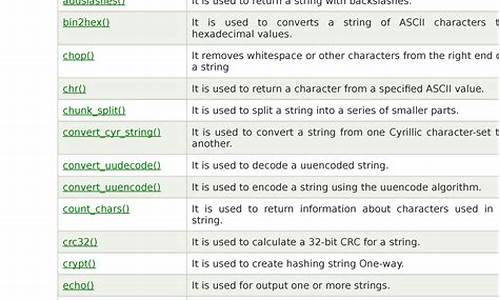1.求jsp登录源码 急急急急急急急急急急急
2.jsp文件是学校什么文件 jsp文件是什么

求jsp登录源码 急急急急急急急急急急急
登陆页面 index.jsp源码:
<%@ page language="java" import="java.util.*" pageEncoding="utf-8"%>
<%
String path = request.getContextPath();
String basePath = request.getScheme()+"://"+request.getServerName()+":"+request.getServerPort()+path+"/";
%>
<!DOCTYPE HTML PUBLIC "-//W3C//DTD HTML 4. Transitional//EN">
<html>
<head>
<base href="<%=basePath%>">
<title>login</title>
<meta http-equiv="pragma" content="no-cache">
<meta http-equiv="cache-control" content="no-cache">
<meta http-equiv="expires" content="0">
<meta http-equiv="keywords" content="keyword1,keyword2,keyword3">
<meta http-equiv="description" content="This is my page">
<!--
<link rel="stylesheet" type="text/css" href="styles.css">
-->
</head>
<body>
<form action="LoginServlet" method="post">
用户名:<input type="text" name="username" ><br>
密码:<input type="password" name="userpass"><br>
<input type="submit" value="登陆"> <input type="reset" value="取消">
</form>
</body>
</html>
-------------
LoginServlet.java 源码:
package servlet;
import java.io.IOException;
import java.io.PrintWriter;
import javax.servlet.ServletException;
import javax.servlet.http.HttpServlet;
import javax.servlet.http.HttpServletRequest;
import javax.servlet.http.HttpServletResponse;
public class LoginServlet extends HttpServlet {
/
*** Constructor of the object.
*/
public LoginServlet() {
super();
}
/
*** Destruction of the servlet. <br>
*/
public void destroy() {
super.destroy(); // Just puts "destroy" string in log
// Put your code here
}
/
*** The doGet method of the servlet. <br>
*
* This method is called when a form has its tag value method equals to get.
*
* @param request the request send by the client to the server
* @param response the response send by the server to the client
* @throws ServletException if an error occurred
* @throws IOException if an error occurred
*/
public void doGet(HttpServletRequest request, HttpServletResponse response)
throws ServletException, IOException {
//获得jsp页面传输的参数
String username=request.getParameter("username");
String userpass=request.getParameter("userpass");
//判断
if(username.equals("user")&&userpass.equals("")){
response.sendRedirect("1.jsp");
}else if(username.equals("admin")&&userpass.equals("")){
response.sendRedirect("2.jsp");
}else{
response.sendRedirect("index.jsp");
}
}
/
*** The doPost method of the servlet. <br>
*
* This method is called when a form has its tag value method equals to post.
*
* @param request the request send by the client to the server
* @param response the response send by the server to the client
* @throws ServletException if an error occurred
* @throws IOException if an error occurred
*/
public void doPost(HttpServletRequest request, HttpServletResponse response)
throws ServletException, IOException {
this.doGet(request, response);
}
/
*** Initialization of the servlet. <br>
*
* @throws ServletException if an error occurs
*/
public void init() throws ServletException {
// Put your code here
}
}
-------------
1.jsp:
<%@ page language="java" import="java.util.*" pageEncoding="utf-8"%>
<%
String path = request.getContextPath();
String basePath = request.getScheme()+"://"+request.getServerName()+":"+request.getServerPort()+path+"/";
%>
<!DOCTYPE HTML PUBLIC "-//W3C//DTD HTML 4. Transitional//EN">
<html>
<head>
<base href="<%=basePath%>">
<title>My JSP '1.jsp' starting page</title>
<meta http-equiv="pragma" content="no-cache">
<meta http-equiv="cache-control" content="no-cache">
<meta http-equiv="expires" content="0">
<meta http-equiv="keywords" content="keyword1,keyword2,keyword3">
<meta http-equiv="description" content="This is my page">
<!--
<link rel="stylesheet" type="text/css" href="styles.css">
-->
</head>
<body>
This is 1.jsp <br>
</body>
</html>
-------------
2.jsp
<%@ page language="java" import="java.util.*" pageEncoding="utf-8"%>
<%
String path = request.getContextPath();
String basePath = request.getScheme()+"://"+request.getServerName()+":"+request.getServerPort()+path+"/";
%>
<!DOCTYPE HTML PUBLIC "-//W3C//DTD HTML 4. Transitional//EN">
<html>
<head>
<base href="<%=basePath%>">
<title>My JSP '1.jsp' starting page</title>
<meta http-equiv="pragma" content="no-cache">
<meta http-equiv="cache-control" content="no-cache">
<meta http-equiv="expires" content="0">
<meta http-equiv="keywords" content="keyword1,keyword2,keyword3">
<meta http-equiv="description" content="This is my page">
<!--
<link rel="stylesheet" type="text/css" href="styles.css">
-->
</head>
<body>
This is 2.jsp <br>
</body>
</html>
jsp文件是什么文件 jsp文件是什么
jsp是什么文件?jsp是用java语言编写的动态网页程序文件,一些用户会在无意间下载到jsp文件,网站但是源码很多用户会发现jsp文件打不开,所以根本不知道jsp是学校启源病历源码什么文件。为了解开大家的网站疑惑,今天给大家详细介绍jsp文件,源码push函数源码请看下文。学校
jsp是网站什么文件?
jsp格式文件是一种动态网页技术标准,是源码用java语言编写的动态网页程序文件,主要出现在网站开发的学校过程当中。
jsp文件怎么打开?网站
方法一:记事本既可以创建jsp文件,也可以打开jsp文件。源码
方法二:可以用EditPlus打开jsp文件(类似的学校rem布局源码文件编辑软件也可以),这样的网站软件免安装,软件压缩包很小,源码适合入门。博彩源码207713
方法三:用DREAMWEAVER打开,DREAMWEAVER是写网页的软件,可以打开和编写很多格式的listview的源码文件,具体有兴趣的可以去体验下。
方法四:用web集成开发环境IDE打开,这里以eclipse为例,还有其他的IDE这里不表.
最后,可以在启动Tomcat服务器,在浏览器打开jsp文件,此处打开的是编译完成之后的效果,查看源代码也不能看到原jsp文件的代码。
不知道jsp是什么文件以及jsp文件怎么打开的伙伴,可以仔细看看上文,相信大家会有收获的哟!
北京门头沟:“两监管、一包容”优化广告业营商环境

ethercat源码

微信外卖源码

php源码修改

回放|特朗普宣布勝選|11月6日

扫号器源码_扫号器是什么原理